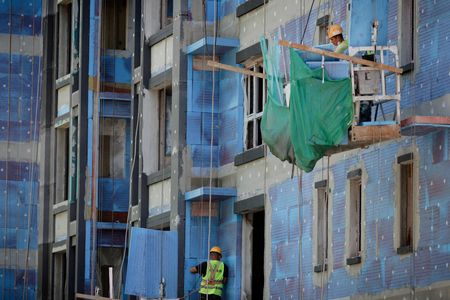By Clare Jim
HONG KONG (Reuters) – China’s Country Garden had some rare good news for the cash-squeezed property sector with an offshore debt repayment on Tuesday, but a closer look reveals just how much developers may still struggle to access capital, developers and analysts said.
China’s largest developer by sales said it repaid its 4.75% dollar bonds with outstanding principal totalling $625 million. The payment was due on Tuesday.
The transaction was made possible in part by the government’s aggressive support measures late last year for the crisis-hit property sector, which accounts for one-fourth of the world’s second-largest economy and has been hobbled by souring demand and mounting debt defaults.
But China’s developers face an even more daunting wall of offshore bond maturities in 2023, and the support policies are so far largely limited to a relatively few healthy “performing” developers, with broader improvements in sector sales and liquidity expected only towards the second half of this year.
The next few months could therefore find more developers starting to miss offshore debt obligations, while many developers that have already defaulted will continue struggling to pin down a restructuring plan for viable long-term repayments.
“The prices of the (performing) developers’ upcoming dollar bonds are trading close to par, suggesting that investors remain sanguine about their near-term liquidity,” said CreditSights, a credit researcher under Fitch.
“However, few have provided detailed refinancing plans, so there is still a chance that negative surprises could emerge.”
This year, Chinese developers’ maturing offshore debt will total $141 billion, up from $120.7 billion in 2022, Refinitiv data showed. The figure represents the amount at issue and does not reflect redemptions and defaults.
Country Garden, the largest offshore debt issuer among performing Chinese developers with $10 billion worth of dollar bonds outstanding, had access to funds not available to most of the developers that must repay those debts.
Since November, it has completed two rounds of share placements in Hong Kong, raising HK$8.6 billion ($1.10 billion). It also secured a $280 million loan from the Hong Kong unit of Industrial and Commercial Bank of China and an HK$5.1 billion interest-free loan from its controlling shareholder Yang Huiyan.
And even Country Garden had to secure an additional guarantee from a state-owned firm in the southern city of Foshan, where it is based, when it raised two mid-term notes last year totalling 3.5 billion yuan ($516 million).
Beijing’s expanded onshore bond issuance programme, part of the support measures, provides guarantees from state-owned China Bond Insurance and allows the proceeds to be used for offshore bond repayment, but it requires the issuer to put up unpledged and quality assets as collateral.
While many private developers have applied to sell yuan bonds under the programme, they typically do not have unpledged collateral, especially after disposing of assets to raise funds during the cash crunch of the past year.
Developers also say that, given the small issue size approved and the priority on using funds to complete home construction projects, they would not expect to use funds for offshore debt repayment.
“The offshore loans approved are so thin and tilted towards a small number of good names that we think the state banks are just doing the minimum to keep the government happy,” said one smaller developer, who declined to be named due to the sensitivity of the issue.
There was, however, a more optimistic view of the longer term, with hopes that debt restructuring could open new financing channels for struggling developers in tandem with the support policies.
An executive at a developer that has defaulted on offshore debt said the company would speed up its debt restructuring process this year as onshore banks have offered to extend new loans once a revamp is complete.
The firm previously would have had little hope of repaying its debt even if it were given two decades to meet its obligations, due to fewer financing sources, the executive added.
“But this year, we think it could be achieved.”
($1 = 7.8194 Hong Kong dollars, 6.7810 Chinese yuan renminbi)
(Reporting by Clare Jim; Editing by Sumeet Chatterjee and Edmund Klamann)

